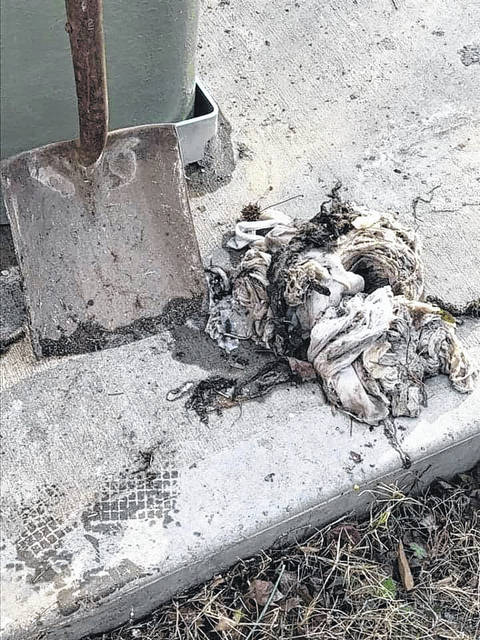As more people continue to protect themselves from the coronavirus (COVID-19) by using disinfectant wipes for their hands or to clean personal spaces, it’s causing a problem for Sampson County’s sewer systems.
Town officials and leaders throughout the area are sharing a similar message — “Wipes Clog Pipes” — and that applies to the ones that says “flushable” on the package too.
“They call them disposable wipes, but they’re not biodegradable,” Roseboro Mayor Alice Butler said. “So it’s very misleading to the public and it’s causing tremendous problems with the sewer system.”
Butler said the wipes get caught in the system and can cause damage with pumping since the material does not break down like toilet paper.
“It’s like a rag getting in there and you get a bunch of them,” she said. “Another thing that’s happening is that people are flushing them and they may not use their toilets a lot and it could actually clog the sewer pipes before it even gets down to the (town system) it can clog it on the customer’s end of it also.”
Butler added that wipes can cause unwanted expenses for homeowners and if it gets to the town’s pumps, caught in the grate, that can be an issue for everyone.
“Pumps are thousands and thousands of dollars,” Butler said. “That cost is going to end up having to be put back on the citizens because your water, sewer fund is called a proprietary fund, meaning it’s supposed to run like a business. It’s not tax money, It’s money that you collect for your water and sewer bills. So when things continually break and your expenses go, it’s got to be pushed back to the ones who are using that service.”
For Roseboro and other towns, it’s been an issue for awhile since companies started to market wipes as “flushable.”
“It’s almost like false advertising,” she said. “Technically, you can flush them. You can flush a lot of things down the toilet, but that doesn’t mean you should. With the coronavirus and everybody now using these Lysol wipes or Clorox wipes or these disinfectants, it made the issue go up even more.
Through a social media message, the town also reminded residents that others materials should not be flushed. Some of those items are paper towels, cat litter, dental floss, or cotton products such as feminine hygiene products.
“These things got to go in the trash,” Butler said. “The only thing that should go in the toilet bowl is the toilet paper. Not these other things.”
Although it’s been an issue for a while in Garland, Mayor Winifred Murphy said it’s getting worse with more people staying at home because of COVID-19. Messages have been posted on social media and calls were made to homes urging residents not to flush the items. Information will also be sent to residents through a mass mailing system to update residents about wipes and other precautions.
“It does clog up their sewer, the lines going to the lagoon, and what ends up happening is that swell and it ends up looking like rags that wrap around our sewer pumps,” she said. “We have to spend man-hours getting that off of our sewer pumps, so it won’t create a sewer spill which would be hazardous to all of us.”
Chris Medlin, director of Clinton’s Public Works & Utilities Department, said it’s an issue the city faces off and on during different times of the year. Due to COVID-19, there’s been a small increase. A few weeks ago, the city released information through Facebook, asking residents not to put wipes in the toilet.
“It’s something we try to get out regularly to our citizens,” Medlin said. “But we have seen a light uptick in it. I know they say they’re flushable, but they do not degrade like toilet paper does and it builds like a barrier or wall inside the pipes. Once it becomes clogged, it’s taking a chance on your actual wastewater backing up into your house and flooding your house.”
Like others, Medlin is stressing that the wipes should be placed in the trash.
“I understand that it’s a big issue and everybody is scared to death,” he said, “but we don’t need to compound the virus problem with other problems.”

